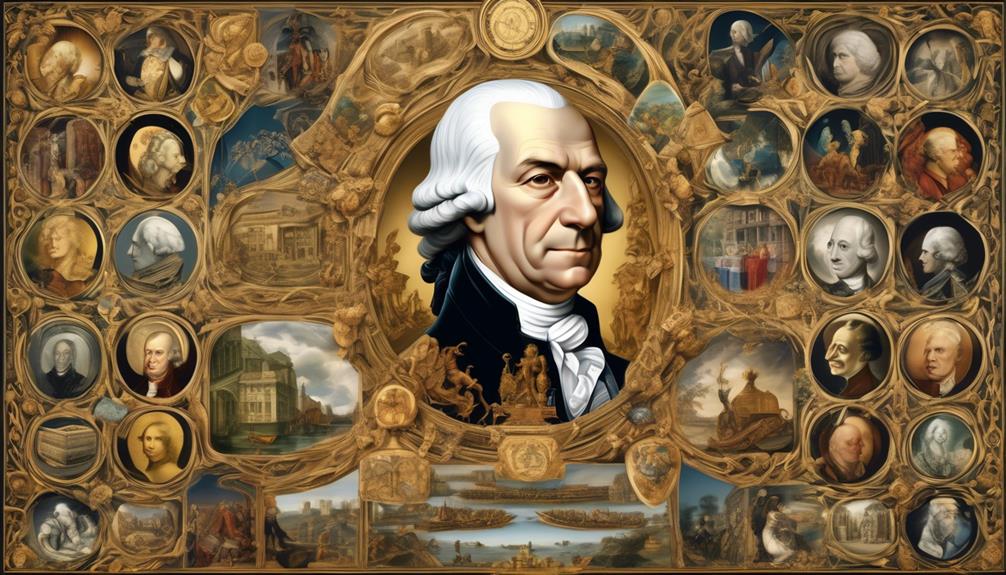As a collective of authors, we draw significant inspiration from the deep insights of Adam Smith, the distinguished economist from Scotland. His quotes serve as a beacon, shining a light on our journey to comprehend the elaborate mechanisms of prosperity and countries.
Through his seminal work, 'The Wealth of Nations,' Smith astutely explores the invisible hand that shapes economies, the significance of division of labor, and the transformative power of free trade and competition. With a discerning eye, he examines the role of government, the drivers of economic growth and development, and the true nature of wealth.
Smith's quotes also debunk the fallacy of mercantilism and emphasize the pursuit of happiness as a vital economic goal. Through his timeless insights, Smith continues to leave an indelible mark on the field of economics.
Key Takeaways
- Adam Smith introduced the concept of the invisible hand, which describes the self-regulating nature of the market and how it efficiently allocates resources without central planning.
- Smith emphasized the importance of free trade and global commerce for increasing wealth and economic prosperity, while acknowledging the need for limited government intervention to ensure fair competition and protect rights.
- Global trade and commerce are crucial for economic growth, and specialization and division of labor lead to increased productivity.
- Government intervention plays a role in ensuring fair competition, providing public goods and services, regulating the financial sector, implementing social welfare programs, and controlling inflation.
The Invisible Hand
The concept of the Invisible Hand, introduced by economist Adam Smith, describes the self-regulating nature of the market and its ability to allocate resources efficiently without the need for central planning. The invisible hand's impact can be seen in the market equilibrium, where supply and demand intersect to determine prices and quantities. When the market is left to operate freely, the invisible hand guides individuals to pursue their self-interests, which in turn leads to the greater good of society as a whole.
In a market economy, the invisible hand works through the mechanism of prices. As demand for a good or service increases, prices rise, signaling to producers that there's an opportunity for profit. This encourages producers to increase their output, leading to an increase in supply. Conversely, if demand decreases, prices fall, signaling to producers that they should reduce their output. This self-regulating mechanism helps to ensure that resources are allocated efficiently, as individuals respond to changes in market conditions.
The invisible hand's impact extends beyond the allocation of resources. It also promotes competition, innovation, and specialization. Through competition, firms strive to offer better products at lower prices, driving efficiency and customer satisfaction. Innovation occurs as firms seek to differentiate themselves from competitors, leading to new technologies and products. Specialization allows individuals and firms to focus on their areas of comparative advantage, leading to increased productivity and economic growth.
On Wealth and Nations

When examining Adam Smith's views on wealth and nations, we can identify three key points:
- Economic prosperity and growth: Smith argued that economic prosperity and growth are achieved through the pursuit of self-interest and the division of labor.
- Global trade and commerce: He emphasized the importance of free trade and the benefits it brings to nations, promoting global commerce as a means to increase wealth.
- The role of government intervention: However, Smith also acknowledged the need for limited government intervention to ensure fair competition and protect the rights of individuals.
Economic Prosperity and Growth
In our exploration of Economic Prosperity and Growth, Adam Smith's seminal work, 'On Wealth and Nations,' provides insightful observations on the factors that contribute to the advancement of economies.
Smith recognized that economic inequality is a natural consequence of the division of labor and the pursuit of self-interest. However, he also believed that sustainable development is essential for long-term economic prosperity.
Smith argued that a well-regulated market, driven by competition and guided by an invisible hand, can lead to overall economic growth and increased living standards. He emphasized the importance of investing in education and infrastructure, as well as promoting free trade and specialization, to maximize economic potential.
Smith's ideas continue to shape economic policies and discussions today, as societies seek to balance economic growth with social and environmental sustainability.
Global Trade and Commerce
Global trade and commerce play a pivotal role in Adam Smith's 'On Wealth and Nations', highlighting the interconnectedness of economies and the potential benefits of international exchange.
- Global supply chains: Smith emphasizes the importance of efficient and well-functioning global supply chains. He argues that countries should specialize in producing goods that they can produce most efficiently and trade with other nations for goods they can't produce as efficiently. This specialization leads to increased productivity and overall economic growth.
- International trade agreements: Smith recognizes the significance of international trade agreements in promoting free trade and reducing barriers to commerce. He argues that governments should refrain from imposing tariffs and restrictions on imports and exports, as these hinder competition and limit the benefits of global trade.
- Economic integration: Smith emphasizes the importance of economic integration among nations. He argues that by fostering strong trade relationships and promoting cooperation, countries can benefit from the exchange of goods, services, and knowledge, leading to mutual prosperity and overall economic development.
Role of Government Intervention
Government intervention plays a crucial role in shaping the economic policies outlined in Adam Smith's 'On Wealth and Nations'. Smith recognized the need for government involvement to ensure economic stability and regulate market forces. His belief in the invisible hand of the market did not negate the necessity of government intervention in certain areas.
| Role of Government Intervention | Economic Stability and Regulation |
|---|---|
| Ensures fair competition | Prevents monopolies |
| Provides public goods and services | Regulates financial sector |
| Implements social welfare programs | Controls inflation |
The Division of Labor

The division of labor, as highlighted by Adam Smith, brings numerous benefits to an economy. By specializing in specific tasks, individuals become more skilled and efficient, leading to increased productivity levels.
This specialization also allows for the efficient allocation of resources, maximizing economic output and growth.
Ultimately, the division of labor plays a crucial role in driving economic efficiency and prosperity.
Benefits of Specialization
Specialization, also known as the division of labor, offers numerous advantages in terms of efficiency, productivity, and economic growth. Here are three key benefits of increased specialization:
- Increased Efficiency: When individuals specialize in specific tasks, they can focus on developing their skills and becoming more proficient. This leads to improved efficiency as they can complete their work faster and with higher quality.
- Higher Productivity: Specialization allows workers to concentrate on a particular task, leading to increased productivity. By specializing, individuals can develop expertise in their area, resulting in higher output and better utilization of resources.
- Economic Advantages: Specialization promotes trade and interdependence among individuals and nations. By specializing in producing goods or services that they've a comparative advantage in, countries can trade with others and benefit from the exchange of goods and services. This leads to economic growth and prosperity.
Increased Productivity Levels
Increased productivity levels can be achieved through the implementation of the division of labor, a system in which tasks are divided and allocated among specialized individuals. This approach allows each worker to focus on a specific task, becoming more efficient and skilled in their area of expertise. As a result, the overall productivity of the workforce increases, leading to economic progress. Adam Smith, the famous Scottish economist and author of 'The Wealth of Nations,' recognized the significance of the division of labor in driving economic growth. Smith stated that "the greatest improvement in the productive powers of labour, and the greater part of the skill, dexterity, and judgment with which it is anywhere directed or applied, seem to have been the effects of the division of labour." The following table illustrates the benefits of the division of labor:
| Benefits of the Division of Labor |
|---|
| Increased productivity |
| Enhanced efficiency |
| Specialization |
| Economic progress |
Economic Efficiency Achieved
By implementing the division of labor, organizations can achieve economic efficiency through increased productivity and enhanced specialization. This concept, introduced by Adam Smith in his influential work 'The Wealth of Nations', highlights the benefits of dividing complex tasks into smaller, specialized ones.
Here are three key reasons why the division of labor leads to economic efficiency:
- Higher productivity: When individuals focus on specific tasks, they become more skilled and proficient, leading to a higher output per worker. This increased productivity results in cost savings and higher overall efficiency.
- Enhanced specialization: By focusing on specific tasks, workers can develop specialized knowledge and expertise, leading to improved efficiency and quality. This specialization allows organizations to produce goods and services more effectively and cater to specific market demands.
- Market competition: The division of labor encourages competition among workers and firms, driving them to find innovative ways to improve efficiency and productivity. This competition leads to a more efficient allocation of resources and promotes economic growth.
Free Trade and Competition

Free trade and competition play a crucial role in promoting economic growth and fostering innovation. The benefits of free trade are numerous. It allows countries to specialize in the production of goods and services in which they've a comparative advantage, leading to increased efficiency and productivity. By eliminating trade barriers such as tariffs and quotas, free trade encourages competition in the market, which in turn drives innovation and lowers prices for consumers. Competition forces businesses to constantly improve their products and services, leading to better quality and greater choice for consumers.
Adam Smith, the famous Scottish economist and author of 'The Wealth of Nations', recognized the importance of free trade and competition. He argued that individuals pursuing their own self-interest in a free market would ultimately benefit society as a whole. Smith believed that competition would lead to the most efficient allocation of resources and the greatest overall welfare. He also emphasized the importance of government policies that promote free trade, such as removing protectionist measures and ensuring fair competition.
In today's globalized world, free trade agreements have become increasingly important in facilitating international trade. Countries that participate in free trade agreements benefit from expanded market access, increased foreign investment, and greater economic integration. However, it's crucial for governments to ensure that competition is fair and that market power isn't abused by monopolies or cartels.
The Role of Government

When examining the role of government in economic matters, there are two key points to consider.
Firstly, government intervention in the economy can have both positive and negative effects. While some argue that government involvement is necessary to correct market failures and ensure social welfare, others believe that excessive intervention can hinder economic growth and individual freedom.
Secondly, government also has a regulatory function to maintain fair competition, protect consumers, and prevent monopolies.
These two points highlight the complex and multifaceted nature of the role of government in the economy.
Government's Economic Intervention
Government intervention in the economy plays a crucial role in shaping and influencing the overall economic landscape. The government's role in economic intervention can be seen in various ways:
- Regulation and oversight: Governments establish and enforce regulations to ensure fair competition, protect consumer rights, and prevent market failures.
- Fiscal policy: Governments use taxation and spending policies to stimulate or slow down economic growth, manage inflation, and stabilize the economy.
- Monetary policy: Central banks, under government control, implement measures such as setting interest rates and controlling the money supply to influence economic activity and maintain price stability.
Government's Regulatory Function
The regulatory function of the government plays a vital role in ensuring a fair and competitive economic environment. The government's role in establishing and enforcing a regulatory framework is crucial for maintaining market stability and protecting consumers.
Through regulations, the government sets standards and guidelines that businesses must follow, preventing unfair practices and promoting healthy competition. These regulations may cover areas such as consumer protection, product safety, environmental standards, and financial regulations.
By implementing and enforcing these rules, the government aims to create a level playing field for all participants in the economy, ensuring that businesses operate ethically and consumers are protected from harm.
A well-designed and effectively implemented regulatory framework is essential for fostering trust and confidence in the economy, promoting economic growth, and safeguarding the interests of all stakeholders.
Self-Interest and the Common Good

In understanding the relationship between self-interest and the common good, it becomes evident that individuals, driven by their own personal motives, can contribute to the greater benefit of society as a whole. Adam Smith, the famous Scottish economist and author of 'The Wealth of Nations,' explored this concept in his works. Here are some key insights:
- Self-interest vs. Altruism:
- Smith argued that individuals are primarily motivated by self-interest, seeking to maximize their own well-being and wealth.
- However, he believed that this pursuit of self-interest can lead to positive outcomes for society, as individuals, in their pursuit of profit, provide goods and services that meet the needs of others.
- Incentives and Motivations:
- Smith recognized that individuals respond to incentives and motivations, such as monetary rewards or the desire for social recognition.
- These incentives can drive individuals to work harder, innovate, and engage in productive activities that benefit not only themselves but also society at large.
- The Invisible Hand:
- Smith introduced the concept of the 'invisible hand,' which suggests that the pursuit of self-interest in a competitive market leads to the common good.
- According to Smith, when individuals seek to maximize their own interests, they inadvertently promote the well-being of society by creating a system of voluntary exchange that allocates resources efficiently.
Smith's ideas on self-interest and the common good highlight the potential for individuals to contribute positively to society through their pursuit of personal gain. By understanding the incentives and motivations that drive human behavior, we can better appreciate the role of self-interest in promoting the overall welfare of society.
The Value of Labor

Labor is a fundamental component of economic value, contributing to the production of goods and services that drive economic growth. Adam Smith recognized the importance of labor in his seminal work, 'The Wealth of Nations'. Smith argued that the value of labor is determined by its contribution to the production process. In a competitive labor market, the value of labor is influenced by various factors, including supply and demand dynamics, skills and qualifications, and productivity levels.
Labor market dynamics play a crucial role in determining the value of labor. When the demand for labor exceeds its supply, wages tend to increase as employers compete for workers. Conversely, when the supply of labor exceeds demand, wages tend to decrease. Additionally, the value of labor is also influenced by factors such as technological advancements and changes in the nature of work.
Smith's insights on the value of labor are still relevant today. In the modern global economy, labor continues to be a vital factor in economic production. Understanding labor market dynamics is essential for policymakers, employers, and workers alike, as it helps inform decisions related to wages, employment levels, and workforce development strategies.
The Power of Markets

Considering Smith's insights on the value of labor, it's imperative to explore the significant role that markets play in shaping economic outcomes. Markets, driven by the forces of supply and demand, are the backbone of a capitalist economy. Their efficiency and ability to allocate resources make them a powerful mechanism for wealth creation and economic growth.
Here are three key aspects that highlight the power of markets:
- The role of competition: Markets thrive on competition, which encourages innovation, efficiency, and lower prices. When businesses compete for consumers' attention, they're forced to continually improve their products and services, leading to better quality and value for customers.
- Market dynamics: Markets are dynamic and constantly changing. They respond to shifts in consumer preferences, technology advancements, and economic conditions. This adaptability allows markets to allocate resources efficiently and adjust to changing circumstances, ensuring the survival and success of businesses.
- Efficiency: Markets are efficient in allocating resources because they rely on the price mechanism. Prices serve as signals, guiding producers and consumers to make decisions about what to produce, how much to produce, and how much to consume. This efficient allocation of resources minimizes waste and maximizes societal well-being.
On Money and Capital

Money and capital are essential components of any economic system, playing crucial roles in facilitating economic transactions and fostering investment and growth. Money management refers to the process of handling and controlling funds, ensuring that they're used efficiently and effectively. It involves activities such as budgeting, investing, and saving. Effective money management is vital for individuals, businesses, and governments to achieve financial stability and achieve their goals.
Capital accumulation, on the other hand, refers to the process of increasing the stock of productive assets in an economy. This includes physical capital, such as machinery and infrastructure, as well as human capital, such as education and skills. Capital accumulation is crucial for economic development and growth. It enables businesses to invest in new technologies and expand their production capacity, leading to increased productivity and higher living standards.
Adam Smith recognized the importance of both money management and capital accumulation in promoting economic prosperity. He emphasized the need for individuals and societies to effectively manage their resources and invest in productive activities. By doing so, Smith believed that wealth and prosperity could be achieved, benefiting both individuals and society as a whole.
The Importance of Education

When considering the importance of education, it becomes evident that it plays a crucial role in society.
Education equips individuals with the necessary knowledge and skills to contribute effectively to their communities and the overall development of a nation.
Additionally, lifelong learning offers numerous benefits, such as personal growth, career advancement, and the ability to adapt to a rapidly changing world.
Education's Role in Society
Education plays a pivotal role in shaping and empowering individuals, allowing them to acquire knowledge, develop critical thinking skills, and contribute to the progress of society.
- Education as a catalyst for social change:
- Education equips individuals with the necessary skills and knowledge to challenge societal norms and effect positive change.
- It fosters a sense of social responsibility and empowers individuals to address social injustices.
- By promoting critical thinking and problem-solving abilities, education encourages individuals to question existing structures and work towards a more equitable society.
- Role of education in societal progress:
- Education provides individuals with the tools to actively participate in the economic, political, and cultural spheres of society.
- It enhances social mobility by opening doors to better opportunities and improving quality of life.
- Education equips individuals with the skills needed for technological advancements and innovation, driving economic growth and societal progress.
Benefits of Lifelong Learning
Lifelong learning offers individuals the opportunity to continually expand their knowledge and skills, enabling personal growth and adaptability in an ever-changing world. The importance of continuous learning can't be overstated in today's society, where technological advancements and shifting job markets require individuals to constantly update their skills.
Lifelong learning benefits individuals in various ways. Firstly, it enhances career prospects by keeping individuals updated with the latest industry trends and developments, making them more valuable to employers.
Additionally, lifelong learning fosters personal growth, as it allows individuals to explore new interests and acquire new knowledge outside of their professional lives.
Furthermore, continuous learning promotes critical thinking, problem-solving, and creativity, which are essential skills in navigating complex challenges and finding innovative solutions.
The Wealth of Nations

In his seminal work, 'The Wealth of Nations,' Adam Smith explores the fundamental principles and dynamics of economic systems. This groundbreaking book delves into various aspects of economic inequality and global economic integration. Here are three key subtopics discussed in 'The Wealth of Nations':
- Economic Inequality:
- Smith examines the causes and consequences of economic inequality within societies. He argues that a certain degree of inequality is natural and even necessary for the functioning of a market economy.
- Smith also emphasizes the role of education and skill development in reducing economic disparities. He suggests that individuals can improve their economic prospects through acquiring knowledge and enhancing their abilities.
- Division of Labor:
- Smith highlights the significance of the division of labor in driving economic growth and prosperity. He explains how the specialization of tasks can increase productivity and efficiency within industries.
- According to Smith, the division of labor isn't limited to individual nations but extends to the global level. He discusses how countries can benefit from specializing in the production of goods and services in which they've a comparative advantage.
- Global Economic Integration:
- Smith recognizes the benefits of international trade and promotes the idea of free trade. He argues that countries can achieve greater wealth and prosperity by engaging in mutually beneficial exchange with other nations.
- Smith also emphasizes the importance of open markets and the removal of trade barriers. He believes that global economic integration can lead to increased competition, innovation, and overall economic growth.
'The Wealth of Nations' remains a seminal text in the field of economics, providing valuable insights into the complexities of economic systems and their impact on society.
Economic Growth and Development

After exploring the causes and consequences of economic inequality and the importance of the division of labor, Adam Smith turns his attention to the crucial topic of economic growth and development in 'The Wealth of Nations'. Smith believed that economic inequality was a natural result of the division of labor, but he also recognized the potential for economic growth to alleviate this inequality. He argued that a nation's wealth and prosperity could be measured by its ability to produce and consume goods and services. In order to achieve sustainable development, Smith emphasized the importance of investing in education, infrastructure, and technological innovation. He believed that these factors would not only increase productivity and economic output, but also create opportunities for upward mobility and reduce economic inequality. Smith's ideas on economic growth and development laid the foundation for modern economic theory and continue to influence policymakers and economists today.
| Key Points | Analysis |
|---|---|
| Economic growth and development | Crucial topic in 'The Wealth of Nations' |
| Economic inequality | Result of division of labor |
| Sustainable development | Investing in education, infrastructure, and technological innovation |
| Increase productivity | Create opportunities for upward mobility |
| Reduce economic inequality | Influence modern economic theory |
The Nature of Wealth

The concept of wealth, as discussed by Adam Smith in 'The Wealth of Nations,' centers around the accumulation of resources and assets that contribute to a nation's economic prosperity. Smith believed that wealth isn't just about the possession of material possessions, but also about the ability to produce and exchange goods and services efficiently.
Here are three key points to consider when examining the nature of wealth:
- Nature vs. Nurture: Smith argued that the accumulation of wealth is influenced by both natural factors, such as access to natural resources, and nurtured factors, such as the development of skills and knowledge. While natural resources can provide a foundation for wealth, it's the human ability to utilize and enhance these resources that ultimately determines economic success.
- Accumulation of Wealth: According to Smith, the accumulation of wealth isn't a zero-sum game. He believed that through specialization and division of labor, individuals can increase their productivity and create more wealth. This idea laid the foundation for the concept of economic growth and the benefits of free trade.
- Role of Government: Smith emphasized the importance of a limited role for government in economic affairs. He argued that governments should focus on protecting property rights and enforcing contracts, allowing individuals to freely pursue their own self-interest, which in turn leads to the accumulation of wealth.
The Fallacy of Mercantilism

By examining the shortcomings of mercantilism, Adam Smith highlights the flaws in the prevailing economic system of his time and presents an alternative perspective on wealth accumulation. Smith believed that mercantilism, with its emphasis on protectionism and trade deficits, was a fallacy that hindered economic growth and prosperity.
Mercantilism, the dominant economic theory in the 18th century, promoted the idea that a country's wealth could be measured by the amount of gold and silver it possessed. This led to policies aimed at accumulating as much precious metal as possible, often through protectionist measures such as tariffs and trade restrictions. However, Smith argued that this approach was misguided.
According to Smith, the fallacy of protectionism lies in its failure to recognize the benefits of free trade. By restricting imports, countries limit their access to foreign goods and services, depriving their own citizens of choice and variety. Moreover, protectionism can lead to retaliatory measures from other nations, resulting in a decrease in overall trade and economic growth.
Smith also criticized the focus on trade deficits as a measure of a country's economic success. While mercantilists viewed trade deficits as a sign of weakness, Smith argued that they were often the result of a country's comparative advantage in certain industries. Trade deficits, he believed, weren't inherently bad and could actually be beneficial if they allowed a country to specialize in areas where it had a competitive edge.
The Pursuit of Happiness

In our pursuit of happiness, Adam Smith emphasizes the importance of individual freedom and economic prosperity. Smith believed that when individuals have the freedom to pursue their own self-interests, it leads to the overall well-being of society.
Here are three key points that highlight Smith's perspective on the pursuit of happiness:
- Individual Well-being: Smith argued that individuals are the best judges of their own well-being. Each person has unique preferences and desires, and they should be free to pursue them without interference. This includes the freedom to choose their own occupation, engage in trade, and accumulate wealth.
- Economic Prosperity: According to Smith, economic prosperity is a key factor in the pursuit of happiness. He believed that a free market system, driven by competition and self-interest, leads to increased productivity and innovation. This, in turn, creates wealth and improves the overall standard of living for society.
- Social Cooperation: While Smith emphasized individual freedom, he also recognized the importance of social cooperation. He argued that individuals are naturally inclined to engage in mutually beneficial exchanges, which promotes economic growth and enhances overall well-being.
Frequently Asked Questions
How Did Adam Smith's Ideas on the Invisible Hand Influence Modern Economic Theory?
Adam Smith's ideas on the invisible hand greatly influenced modern economic theory. His concept of the invisible hand suggested that individuals acting in their own self-interest would inadvertently contribute to the overall benefit of society.
This idea has had a profound influence on capitalism, as it emphasizes the importance of individual freedom and the power of market forces. Furthermore, Smith's ideas on the invisible hand have contributed to the understanding of market efficiency and the role of competition in driving economic growth.
What Were Some of the Criticisms of Adam Smith's Theories on the Division of Labor?
Some criticisms of Adam Smith's theories on the division of labor include concerns about worker alienation, lack of skill development, and the potential for exploitation. Critics argue that the division of labor can lead to monotonous, unfulfilling work and stifle creativity.
They also argue that specialization may limit workers' ability to develop a wide range of skills. Additionally, there are concerns about the power imbalances that can arise when employers have control over the specific tasks assigned to workers.
How Did Adam Smith View the Role of Government in Relation to Free Trade and Competition?
In understanding the role of government in relation to free trade and competition, we find that Adam Smith's views were insightful and forward-thinking. Smith believed that government should have a limited role in the economy, allowing free trade to flourish and competition to drive innovation.
What Did Adam Smith Mean by the Term "Self-Interest" and How Does It Relate to the Common Good?
Adam Smith's concept of 'self-interest' refers to individuals pursuing their own economic interests. However, Smith argued that this pursuit can lead to the common good.
He believed that when individuals freely engage in trade and competition, their self-interest aligns with the interests of society as a whole, resulting in increased wealth and prosperity.
Smith's ideas on self-interest and the common good have influenced the concept of the invisible hand in modern economic theory, which suggests that markets can self-regulate and benefit society.
What Did Adam Smith Believe Was the Importance of Education in Promoting Economic Growth and Development?
The importance of education in promoting economic growth and development can't be overstated. Education equips individuals with the necessary skills and knowledge to contribute to the economy. It fosters innovation, productivity, and entrepreneurship, which are vital for economic progress.
Adam Smith recognized the pivotal role of education in his work. He believed that an educated population would lead to a more prosperous and thriving society, as it enables individuals to make informed decisions and participate actively in economic activities.
What Contributions Did Paul Samuelson Make to Economics Compared to Adam Smith?
Paul Samuelson, an eminent economist, made significant contributions to the field, much like Adam Smith. While Adam Smith is known as the “father of economics,” Samuelson’s famous quotes have revolutionized the discipline. Samuelson’s works focused on mathematical economics, introducing rigorous analysis into the field. His research and famous quotes like “Economics is a study of mankind in the ordinary business of life” have shaped modern economic theory and policy. Both economists have left indelible marks, each contributing uniquely to the study of economics.
Conclusion
In conclusion, Adam Smith's quotes offer valuable insights into the world of economics and the functioning of nations. His ideas on the invisible hand, division of labor, and free trade emphasize the importance of individual freedom and competition for economic growth.
Smith also highlights the role of government in creating a conducive environment for wealth creation. As we reflect on his teachings, we must ask ourselves: How can we apply Smith's principles to shape a prosperous and equitable society?
Joy, as our Editor in Chief, ensures the highest standard of content. Her talent in writing is complemented by her attention to detail and passion for literature and culture. Joy’s expertise and love for the English language shine through in her editorial work, making each piece a testament to quality and clarity.









